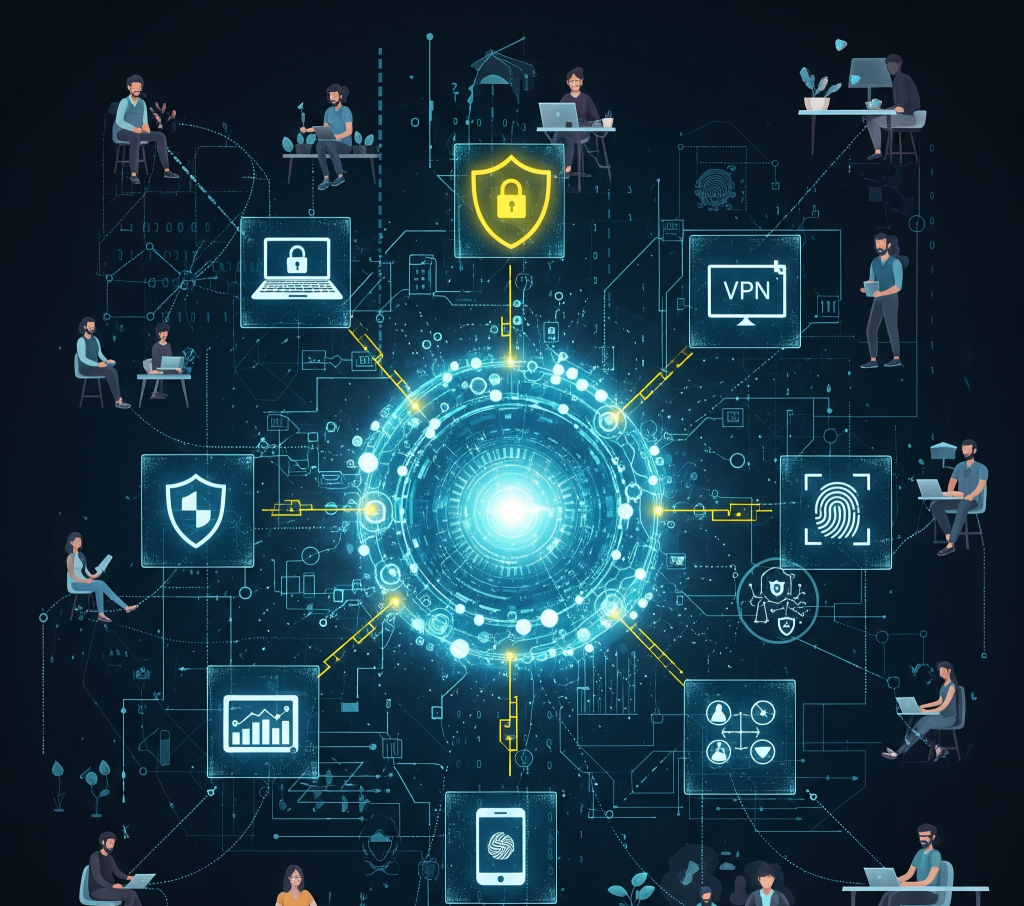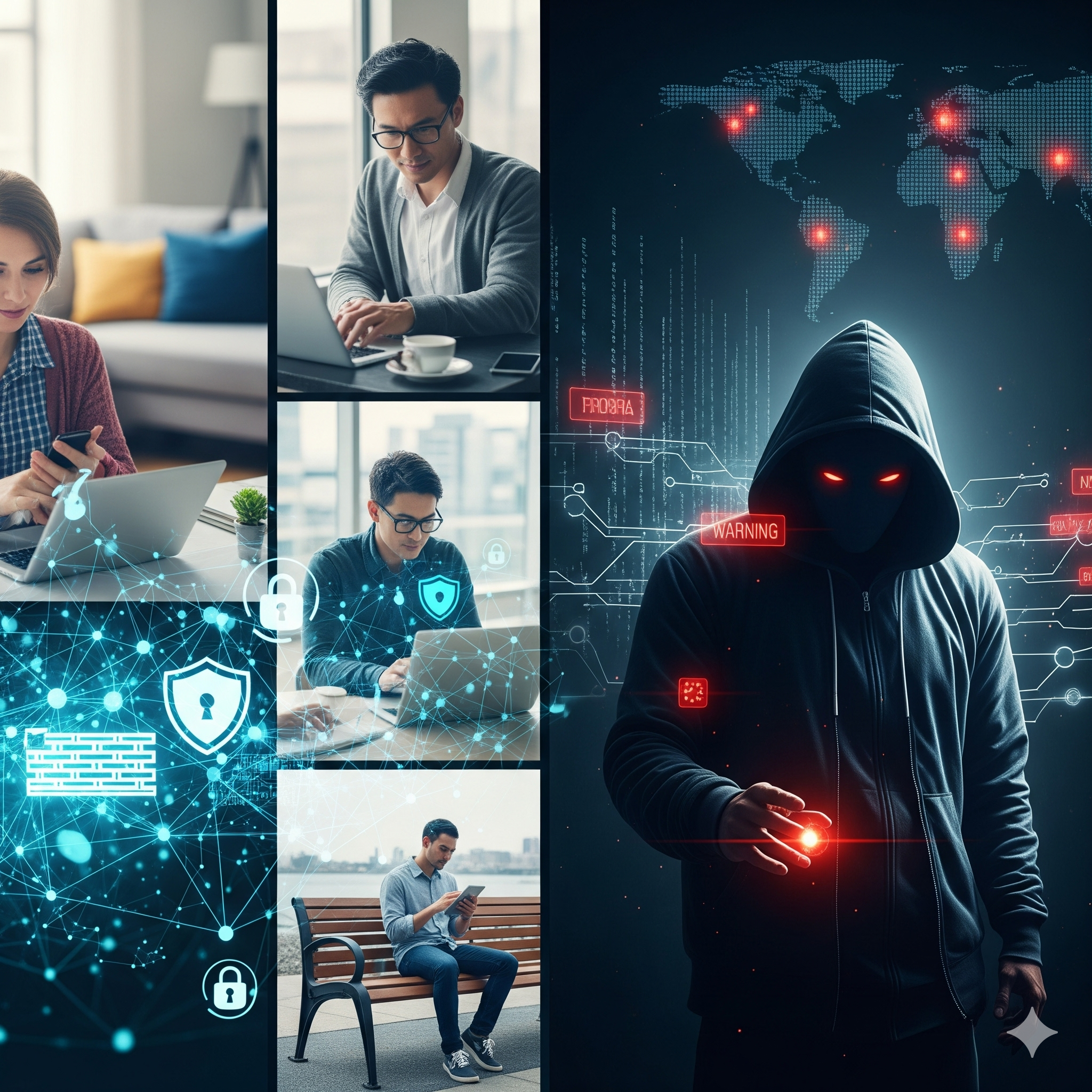Introduction
The rise of remote jobs has completely changed how businesses operate and how professionals connect with their work. Flexibility, reduced commuting, and access to global talent have made remote work a permanent fixture in modern employment. Yet, alongside these benefits comes a pressing challenge: cybersecurity. When employees operate outside the controlled boundaries the rise of remote jobs has made cybersecurity in remote job environments more important than ever.
of office networks, risks increase. Cyber criminals exploit weaker personal devices, unsecured Wi-Fi networks, and human error to target remote workers. The rise of remote jobs has completely changed how businesses operate, but it has also made cybersecurity in remote job environments a critical concern.
This reality makes cybersecurity not just a technical requirement but a critical business necessity. For both individuals and organizations, securing digital work spaces ensures productivity, protects sensitive information, and builds trust in the remote-first era.
You can read the summary of this article here.
Remote Work and the Expanding Threat Landscape
The shift to remote work has broadened the attack surface for cyber threats. In traditional office setups, centralized IT systems managed firewalls, network monitoring, and access control. Once employees began working from home or co-working spaces, those protections became fragmented. Unsecured routers, outdated software, and file-sharing across personal devices opened new vulnerabilities. Phishing scams, ransomware, and credential theft now target remote employees as entry points to larger organizational systems. For instance, reports show that phishing attacks increased by over 60% during the height of remote work adoption in 2020, and the trend hasn’t slowed since. These statistics highlight that cyber criminals adapt quickly to new work models, making proactive defense more important than ever.
Protecting Data Beyond Office Walls
Remote work relies heavily on cloud services, video conferencing tools, and collaborative platforms. While these tools improve efficiency, they also introduce risks if not properly secured. Sensitive company data travels across various networks, often without encryption if users neglect basic security practices. An employee sharing confidential files over a public Wi-Fi connection unknowingly puts company assets at risk. To counter this, cybersecurity practices like VPN usage, two-factor authentication, and endpoint security software have become essential. But tools alone aren’t enough. Employees must understand the responsibility they carry in safeguarding organizational data, especially when they’re the first line of defense against breaches. Cybersecurity awareness has therefore evolved from being an IT department’s job to a shared responsibility across all levels of remote work.
The Human Factor: Training and Awareness in Remote Jobs
Technology can only go so far without the right mindset. Studies consistently show that human error is a major cause of data breaches, often more than technical vulnerabilities. Remote employees, juggling tasks in their home environments, can be more susceptible to scams or negligent in updating security patches. This is where consistent cybersecurity training becomes indispensable. Organizations that integrate security awareness programs see a significant drop in successful phishing attempts. Simple practices like identifying suspicious emails, avoiding “Employee awareness programs are essential to strengthening cybersecurity in remote job environments.”
unauthorized downloads, and maintaining strong password hygiene create a safer environment for remote work. Moreover, employees feel more empowered when they understand how their actions directly contribute to securing their workplace. Awareness, when combined with robust policies, builds a culture of security resilience in remote job environments.

Balancing Flexibility with Security Controls
The Challenge of Flexibility in Remote Work
One of the biggest challenges in remote work is maintaining the balance between flexibility and control. Employees expect freedom to use their devices and work across multiple platforms. However, organizations cannot compromise on data protection. This balance requires thoughtful cybersecurity strategies.
Zero Trust Models for Remote Job Security
Zero Trust models, which verify every user and device regardless of location, have gained popularity in remote-first companies. These models strike the right balance between flexibility and cybersecurity in remote job environments, ensuring that no device or user can access data without proper authentication.
Cloud Security and Role-Based Access
At the same time, secure cloud solutions and role-based access systems allow organizations to manage permissions effectively. Instead of restricting remote workers, these tools enable secure freedom, giving employees flexibility while protecting critical business data.
The Benefits of Balanced Cybersecurity
For employees, this means they can enjoy the benefits of working from anywhere while knowing that sensitive information remains protected. Companies that successfully strike this balance not only reduce risks but also enhance employee satisfaction and productivity.
Conclusion
Remote jobs are here to stay, but their sustainability depends heavily on how well cybersecurity challenges are addressed. From expanding threat landscapes to human vulnerabilities, every aspect of remote work requires deliberate protection strategies. Strong security measures, continuous training, and smart use of technology create a safe environment where employees can thrive. “The future of remote jobs depends on robust cybersecurity in remote job environments.”
“The future of remote jobs depends on robust cybersecurity in remote job environments.”
For businesses, investing in cybersecurity isn’t just about preventing financial loss; it’s about building credibility and trust with clients, partners, and employees. In an era where remote work defines the future of employment, cybersecurity has become the backbone that holds this ecosystem together. Prioritizing it ensures not just survival but success in the digital workplace.
Find Your Dream Job Today Explore Endless Career Opportunities and Secure Your Next Role with best job tool



